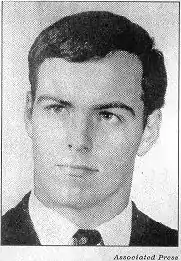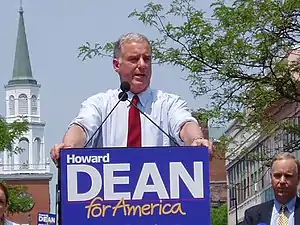
Charles Dean and Neil Sharman were American and Australian citizens, respectively, travelling through Southeast Asia on a backpacking trip in 1974 when they were kidnapped and killed by Communist guerillas. Charles "Charlie" Dean (aged 24) was the brother of future US politician and Democratic National Committee Chairman Howard Dean, Democracy for America Chairman Jim Dean, and political activist Bill Dean. Neil Sharman (aged 23), was a journalist taking time off from his career to see the world. The two were captured and killed by the Communist Pathet Lao guerrillas.
On 14 November 2003, Dean's remains were repatriated to the United States, and Sharman's were repatriated to Australia.[1][2]
Charles Dean
Dean grew up in Manhattan and worked summers as a volunteer counselor with Boys Harbor.[3] Dean graduated from the University of North Carolina at Chapel Hill where he was active in student government and the anti-war movement in 1972.[4][5] In 1972, he went on to work as the Orange County, North Carolina coordinator for Democrat George S. McGovern's 1972 presidential campaign.
In 1973 Dean travelled to Japan by freighter, then to Australia where he worked on a sheep station for 9 months.[4] While there he met Australian journalist Neil Sharman.[4] In 1974, the two travelled to Laos to visit a friend of the Dean family who worked for USAID.
Together with Sharman, Dean stayed in a bungalow on the Mekong River, planning to meet another friend who was serving in the Peace Corps in Nepal.[4] In early September 1974, Dean and Sharman took a raft down the Mekong River to Thailand.[6] They were stopped at a checkpoint near a small village called Pak Him Boun, two miles southeast of the capital of Laos, Vientiane, by Pathet Lao communist guerrillas who imprisoned the two, apparently believing they were spies because they were carrying cameras.
Dean's parents traveled to Laos where they met with Premier Souvanna Phouma and Prime Minister Prince Souphanouvong in May 1975 in an effort to obtain the release of Dean and Sharman.[7] The U.S. government demanded the release of both Dean and Sharman.[8] Dean was classified as a POW-MIA although he was a civilian, leading to speculation that he was working for the Central Intelligence Agency.[9] According to Howard Dean, his parents believed this to be true, though Howard Dean does not. The CIA says it has no records that Charles Dean was ever in their employ.[9]
A memorial service was held for Dean at St. Luke's Episcopal Church in Easthampton, New York, in the year following his presumed death.[10]
Neil Sharman
Neil Sharman who had previously worked as a journalist for the Sydney Morning Herald was working for the Northern Territory News when he wrote to tell his brother in 1973 that he was taking a backpack and heading off to see "Indonesia, Malaysia, India and all places in between. Maybe the Arab countries (If we can without being shot)."[11][12] Sharman's girlfriend, Joy Hooper, who had been travelling with the two men, searched desperately for information on the two, questioning government officials across the region for several months before returning home to Australia.[13][14]
Execution
Although not widely known at the time, Dean and Sharman were executed by the Pathet Lao on or about 14 December 1974.[5] In 2000, accounts given by people who had seen the two young men killed enabled the identification of the site where Dean and Sharman were believed to have been buried.[5] Examination of the remains after their 2003 recovery showed that the two young men had been handcuffed and shot.[15]
Repatriation of remains
On 11 November 2003. Howard Dean confirmed that a joint Laotian-US task force had discovered remains thought to be those of his younger brother, and DNA analysis subsequently confirmed that the remains were Charles's.[16] In May 2004, Charles's remains were buried, with his three brothers and his mother in attendance. Charles's death has been widely reported by Howard Dean as having had a major influence on his life; on most days, he wears a black leather belt that once belonged to Charles.[17]
References
- ↑ US returning remains of war victims: [1 State Edition] The Daily Telegraph (Sydney) 24 November 2003.
- ↑ "Laos returns Westerners' remains". BBC. 24 November 2003.
- ↑ Friend Recalls Young Deans, Ellis Henican, Newsday, 10 Dec 2003: A04.
- 1 2 3 4 Squitieri, Tom (19 November 2003). "Laos remains may be of Dean's brother". USA Today. ProQuest 408954670.
- 1 2 3 "Pentagon Recovers Remains Believed to Be Howard Dean's Brother". Fox News. AP. 18 November 2003. Retrieved 14 November 2016.
- ↑ Wilgoren, Jodi (27 November 2003). "Dean Pauses to Reflect on a Brother's Long Trip Home". New York Times. ProQuest 432565770.
- ↑ "Notes on People; Kissinger Fills in for His Wife". New York Times. 13 May 1975. ProQuest 120431293.
- ↑ "Shelling at Hue". Washington Post. 3 December 1974. ProQuest 146105525.
- 1 2 Blomquist, Brian (November 19, 2003). "Dean's 30-Yr. Ordeal; Body of Long-Missing Brother Found In Laos". New York Post. New York, NY.
- ↑ "Rites for Charles Dean, 24, Missing in Laos Last Year". New York Times. 28 May 1975. ProQuest 120406406.
- ↑ Whittaker, Mark (29 May 2004). "Wartime puzzle comes to sad end". The Australian. ProQuest 356529992.
- ↑ Jameson, Neil (11 April 2014). "Neil Sharman; journalist who disappeared in Laos, 1974". The Newcastle Herald. Retrieved 14 November 2016.
- ↑ Keavney, Kay (26 March 1975). "Australian Girl's Exclusive Love Story". The Australian Women's Weekly. Retrieved 30 November 2016.
- ↑ Louella Bryant While in Darkness There Is Light: Idealism and Tragedy on an Australian Commune 1480425826 2013 "... when Charlie met Neil Sharman, he felt as if he had known the Australian for years. Neil worked for Northern Territory News in Darwin. "
- ↑ "Grim find solves mystery". Herald Sun. 19 November 2013. ProQuest 360549503.
- ↑ Jodi Wilgoren and Michael Slackman (November 19, 2003). "Remains of Dean's Long-Missing Brother Found". The New York Times. Retrieved 2014-07-27.
On Tuesday, Dr. Dean, who rarely mentions his family on the stump, interrupted his schedule to announce that a search team had found his brother's remains buried in a rice paddy in central Laos. ...
- ↑ Wilgoren, Jodi (November 27, 2003). "Dean Pauses to Reflect on a Brother's Long Trip Home". The New York Times. New York, NY.
Further reading
- Dr. Howard Dean, Winning Back America (Simon & Schuster, 2003) ISBN 0-7432-5571-2.
